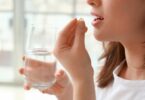Polycystic ovary syndrome (PCOS) is an extremely complex disease that doesn’t only affect the body, but also mental health. Women with PCOS suffer from anxiety disorders and depression much more often than others. An increased risk of obsessive-compulsive disorder, bipolar disorder and eating disorders is also suspected.
How PCOS can impair mental health
It is not yet known exactly why PCOS patients struggle with psychological problems more than others. But there are some very good guesses and ideas.
Obviously, the PCOS symptoms themselves can present a significant psychological burden for many patients. Infertility, obesity, acne and hirsutism (excessive facial and body hair) lead to stress and worry.
And the typical changes in the hormone balance in PCOS may very well contribute as well. Every woman knows how strong hormonal turbulence can affect mental well-being even in normal times – just think of the emotional turmoil just before menstruation, during pregnancy, shortly after childbirth or, for example, under the influence of artificial hormones (depression is a well-known side effect of birth control pills). So it stands to reason that the hormonal turbulence that is so typical of PCOS surely must have an impact on the psyche of those affected.
It is also conceivable that people with PCOS who suffer from anxiety or depression have altered neurotransmitter levels. For example, one study showed that PCOS patients who had low levels of serotonin (a chemical messenger in the nervous system associated with positive feelings) were more likely to report symptoms of depression and anxiety.
This is how PCOS patients can support their mental health
Medical support
If you suffer from PCOS and are repeatedly depressed or anxious or notice mood swings, it is important not to deal with everything yourself, but to talk to your health carer about your problems and concerns. Even if it doesn’t feel like it right now: There is way more support available than you think!
Lifestyle and mental health
In addition to the medical options that you can discuss with your health carer, there are things you can do yourself to make you feel better. It is known from many studies that an active lifestyle helps to improve mental health in most people. However, you should be aware that changing your lifestyle does not work as quickly as a drug, but that long-term and therefore sustainable effects are key.
Studies show that people with PCOS who exercise regularly are significantly less likely to experience symptoms of anxiety and depression. The effect on depression can be measured from at least 2.5 hours per week of moderate physical activity.
So make sure you set aside at least 2.5 hours a week for exercise. Anything you enjoy is perfect. Don’t exaggerate, but increase slowly, that’s the only way to stick with it. You may have guessed it already : This isn’t about 2 weeks in January, it’s supposed to be something long-term 😊
So feel free to do some brainstorming: what would I enjoy doing? Turn up the music and dance in the apartment? A walk in the woods? Explore the area on a bike tour? Maybe even try a new hobby?
And if time is in short supply: where can I take the stairs instead of the elevator? Can I walk the last bit on the way to work? Can I walk over to the neighboring office for a personal conversation instead of writing an email (I’ve just read that it’s also much more environmentally friendly and – depending on the colleague – often nicer, too) – feel free to be creative 🌺
Found something? Excellent! Now, it is still important to ensure a balance in your life so that, in addition to more activity, relaxation should also have a regular place. Awareness exercises are ideal, but yoga, guided relaxation, breathing exercises, and meditation may also reduce the symptoms of anxiety disorders in people with PCOS.
Dietary supplements
Drugs like metformin, which help the body use insulin properly, are known to improve symptoms of depression in people with PCOS. As an alternative to metformin and much more gentle, the natural food component inositol, which is also used as a food supplement, can be used to the same effect.
Taking omega-3 fatty acids – either alone from fish oil or in combination with vitamin D – also seems to be able to alleviate depression and anxiety in people with PCOS.
Unfortunately, the number of scientific studies on the subject is still quite limited, but it can’t hurt to try out for yourself what’s good for you 😊
Have you already made your own experiences with changing your lifestyle and diet? Have you already used dietary supplements? Write to us in the comments!
References:
Alesi S, Ee C, Moran LJ, Rao V, Mousa A. Nutritional Supplements and Complementary Therapies in Polycystic Ovary Syndrome. Adv Nutr. 2022 Aug 1;13(4):1243-1266. doi: 10.1093/advances/nmab141. PMID: 34970669; PMCID: PMC9340985.
Amini M, Bahmani F, Foroozanfard F, Vahedpoor Z, Ghaderi A, Taghizadeh M, et al. The effects of fish oil omega-3 fatty acid supplementation on mental health parameters and metabolic status of patients with polycystic ovary syndrome: a randomized, double-blind, placebo-controlled trial. J Psychosom Obstet Gynaecol. 2018.
Annagur BB, Tazegul A, Uguz F, Kerimoglu OS, Tekinarslan E, Celik C. Biological correlates of major depression and generalized anxiety disorder in women with polycystic ovary syndrome. J Psychosom Res. 2013;74:244-7.
Banting LK, Gibson-Helm M, Polman R, Teede HJ, Stepto NK. Physical activity and mental health in women with polycystic ovary syndrome. BMC Women’s Health. 2014;14(51).
Barry JA, Kuczmierczyk AR, Hardiman PJ. Anxiety and depression in polycystic ovary syndrome: a systematic review and meta-analysis. Hum Reprod. 2011;26(9):2442–51.
Barry JA, Hardiman PJ, Saxby BK, Kuczmierczyk A. Testosterone and mood dysfunction in women with polycystic ovarian syndrome compared to subfertile controls. J Psychosom Obstet Gynaecol. 2011;32(2):104-11.
Berni TR, Morgan CL, Berni ER, Rees DA. Polycystic ovary syndrome Is associated with adverse mental health and neurodevelopmental outcomes. J Clin Endocrinol Metab. 2018;103(6):2116–25.
Blay SL, Aguiar JV, Passos IC. Polycystic ovary syndrome and mental disorders: a systematic review and exploratory meta-analysis. Neuropsychiatr Dis Treat. 2016;12:2895-903.
Brutocao C, Zaiem F, Alsawas M, Morrow AS, Murad MH, Javed A. Psychiatric disorders in women with polycystic ovary syndrome: a systematic review and meta-analysis. Endocrine. 2018.
Cantelmi T, Lambiase E, Unfer VR, Gambioli R, Unfer V. Inositol treatment for psychological symptoms in Polycystic Ovary Syndrome women. Eur Rev Med Pharmacol Sci. 2021 Mar;25(5):2383-2389. doi: 10.26355/eurrev_202103_25278. PMID: 33755979.
Clayton WJ, Lipton M, Elford J, Rustin M, Sherr L. A randomized controlled trial of laser treatment among hirsute women with polycystic ovary syndrome. Br J Dermatol. 2005;152:986-92.
Cooney LG, Lee I, Sammel MD, Dokras A. High prevalence of moderate and severe depressive and anxiety symptoms in polycystic ovary syndrome: a systematic review and meta-analysis. Hum Reprod. 2017;32(5):1075-91.
Damone AL, Joham AE, Loxton D, Earnest A, Teede HJ, Moran LJ. Depression, anxiety and perceived stress in women with and without PCOS: a community-based study. Psychol Med. 2018.
Erensoy H, Niafar M, Ghafarzadeh S, Aghamohammadzadeh N, Nader ND. A pilot trial of metformin for insulin resistance and mood disturbances in adolescent and adult women with polycystic ovary syndrome. Gynecol Endocrinol. 2018.
Galletly C, Moran L, Noakes M, Clifton P, Tomlinson L, Norma R. Psychological benefits of a high-protein, low-carbohydrate diet in obese women with polycystic ovary syndrome- a pilot study. Appetite. 2007;49:590-3.
Greenwood EA, Pasch LA, Cedars MI, Legro RS, Eisenberg E, Huddleston HG. Insulin resistance is associated with depression risk in polycystic ovary syndrome. Fertil Steril. 2018;110(1):27-34.
Hadjiconstantinou M, Mani H, Patel N, Levy M, Davies M, Khunti K, et al. Understanding and supporting women with polycystic ovary syndrome: a qualitative study in an ethnically diverse UK sample. Endocr Connect. 2017;6:323–30.
Jamilian M, Samimi M, Mirhosseini N, Ebrahimi FA, Aghadavod E, Talaee R, et al. The influences of vitamin D and omega-3 co-supplementation on clinical, metabolic and genetic parameters in women with polycystic ovary syndrome. J Affect Disord. 2018;238:32-8.
Kashani L, Omidvar T, Farazmand B, Modabbernia A, Ramzanzadeh F, Tehraninejad ES, et al. Does pioglitazone improve depression through insulin-sensitization? Results of a randomized double-blind metformin-controlled trial in patients with polycystic ovarian syndrome and comorbid depression. Psychoneuroendocrinology. 2013;38:767-76.
Lamb JD, Johnstone EB, Rousseau JA, Jones CL, Pasch LA, Cedars MI, et al. Physical activity in women with polycystic ovary syndrome: prevalence, predictors, and positive health association. Am J Obstet Gynecol. 2011;204(352).
Livadas S, Chaskou S, Kandaraki AA, Skourletost G, Economou F, Christou M, et al. Anxiety is associated with hormonal and metabolic profile in women with polycystic ovarian syndrome. Clin Endocrinol. 2011;75:698-703.
Nidhi R, Padmalatha V, Nagarathna R, Amritanshu R. Effect of holistic yoga program on anxiety symptoms in adolescent girls with polycystic ovarian syndrome: A randomized control trial. Int J Yoga 2012;5:112-7.
Shi X, Zhang L, Fu S, Li N. Co-involvement of psychological and neurological abnormalities in infertility with polycystic ovarian syndrome. Arch Gynecol Obstet. 2011;284:773-8.
Snyder BS. The lived experience of women diagnosed with Polycystic Ovary Syndrome. J Obstet Gynecol Neonatal Nurs. 2006;35(3):385-92.
Stefanaki C, Bacopoulou F, Livadas S, Kandaraki A, Karachalios A, Chrousos GP, et al. Impact of a mindfulness stress management program on stress, anxiety, depression and quality of life in women with polycystic ovary syndrome: a randomized controlled trial. Stress. 2015;18(1):57-66.
Stener-Victorin E, Holm G, Janson PO, Gustafson D, Waern M. Acupuncture and physical exercise for affective symptoms and health-related quality of life in polycystic ovary syndrome: secondary analysis from a randomized controlled trial. BMC Complement Altern Med. 2013;13(131).
Thomson RL, Buckley JD, Lim SS, Noakes M, Clifton PM, Norman RJ, et al. Lifestyle management improves quality of life and depression in overweight and obese women with polycystic ovary syndrome. Fertil Steril. 2010;94:1812-6.
Veltman-Verhulst SM, Boivin J, Eijkemans MJ, Fauser BJ. Emotional distress is a common risk in women with polycystic ovary syndrome: a systematic review and meta-analysis of 28 studies. Hum Reprod Update. 2012;18(6):638-51.
Xing L, Xu J, Wei Y, Chen Y, Zhuang H, Tang W, Yu S, Zhang J, Yin G, Wang R, Zhao R, Qin D. Depression in polycystic ovary syndrome: Focusing on pathogenesis and treatment. Front Psychiatry. 2022 Aug 31;13:1001484. doi: 10.3389/fpsyt.2022.1001484. PMID: 36117653; PMCID: PMC9470949.







